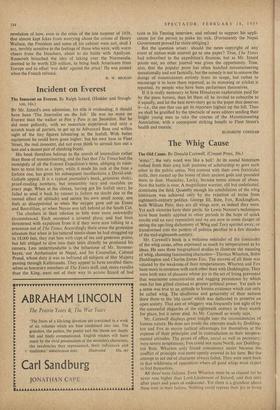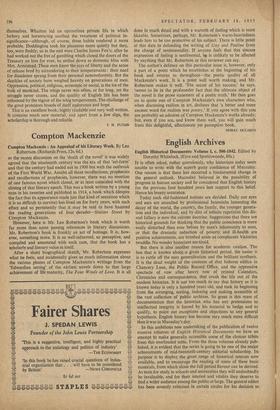The Whig Cause
The Old Cause. By Donald Carswell. (Cresset Press, 30s.) 'wino ! ', the very word was like a bell! At its sound historians ruched from their own lush pastures of scholarship to gore each other in the public arena. Not content with their own fratricidal strife, they rooted up the bones of their ancient gods and pounded them to dust. Macaulay, Lecky, became terms almost of abuse. Now the battle is over. A magnificent warrior, old but undefeated, dominates the field. Quaintly enough his annihilation of the whig historians was achieved only by the rejection of tories from eighteenth-century politics. George III, Bute, Fox, Rockingham, both William Pitts; they are all whigs now, as indeed they were. Yet such victories have their perils. Sir Lewis Namier's techniques have been hastily applied to other periods in the hope of quick results and an easy reputation and we are now in some danger of seeing the age-long dichotomy of Whig and Tory spirited away, or transformed into the pattern of politics peculiar to a few decades of the mid-eighteenth century. themselves. Wharton led an uproarious private life in which lechery and horseracing soothed the vexations of political in- significance—although, of course, these habits rendered it more probable. Doddington took his pleasures more quietly but they, too, were fleshly; so in the end were Charles James Fox's; after he had worked out the fret of gambling which closed the doors of the Treasury on him for ever, he settled down to domestic bliss with Mrs. Armistead. These men knew the joys of liberty and the sense of release bred by surrendering to their temperaments: their need for dissidence sprang from their personal nonconformity. But the shackles of society have weighed heavily on generations of men. Oppression, political, religious, economic or social, is the lot of the bulk of mankind. The whigs never win often, or for long, yet the struggle never ceases, and the quality of English life has been enhanced by the vigour of the whig temperament. The challenge of the great protestors breeds of itself endurance and hope.
This is an excellent book; highly readable and very well written. It contains much new material, and apart from a few slips, the scholarship is thorough and reliable.
3. H. PLUMB











































 Previous page
Previous page